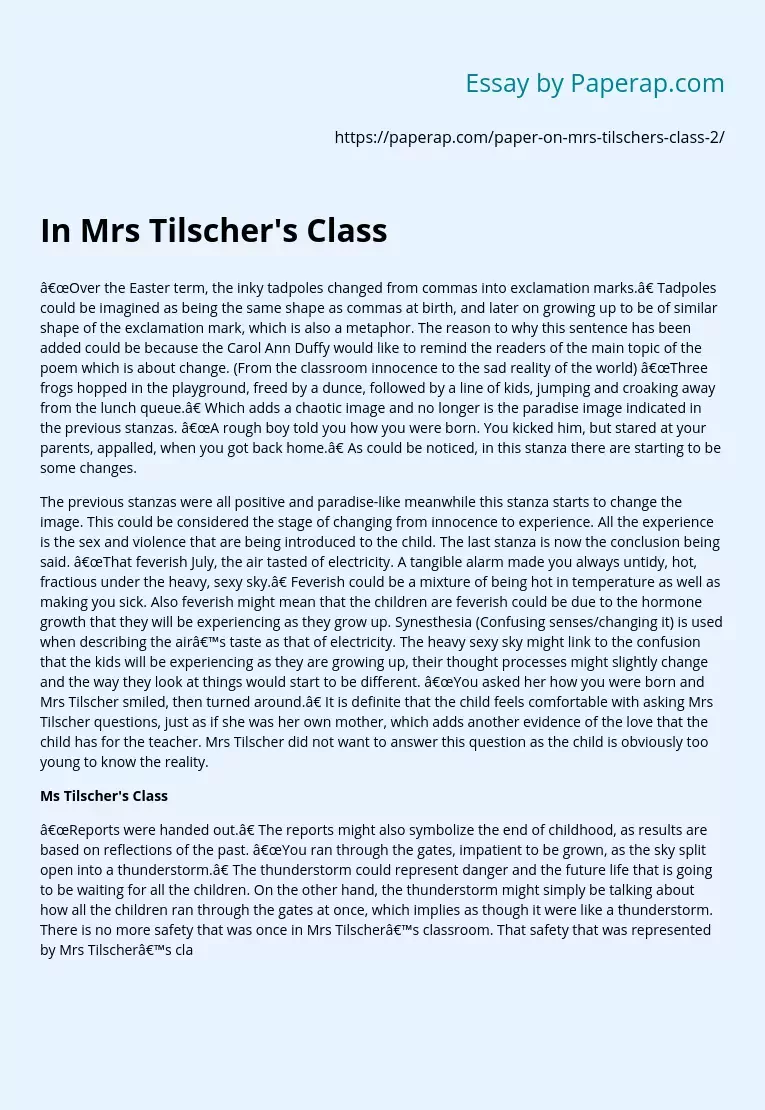“Over the Easter term, the inky tadpoles changed from commas into exclamation marks.” Tadpoles could be imagined as being the same shape as commas at birth, and later on growing up to be of similar shape of the exclamation mark, which is also a metaphor. The reason to why this sentence has been added could be because the Carol Ann Duffy would like to remind the readers of the main topic of the poem which is about change. (From the classroom innocence to the sad reality of the world) “Three frogs hopped in the playground, freed by a dunce, followed by a line of kids, jumping and croaking away from the lunch queue.
” Which adds a chaotic image and no longer is the paradise image indicated in the previous stanzas. “A rough boy told you how you were born. You kicked him, but stared at your parents, appalled, when you got back home.” As could be noticed, in this stanza there are starting to be some changes.
The previous stanzas were all positive and paradise-like meanwhile this stanza starts to change the image. This could be considered the stage of changing from innocence to experience. All the experience is the sex and violence that are being introduced to the child. The last stanza is now the conclusion being said. “That feverish July, the air tasted of electricity. A tangible alarm made you always untidy, hot, fractious under the heavy, sexy sky.” Feverish could be a mixture of being hot in temperature as well as making you sick.
Also feverish might mean that the children are feverish could be due to the hormone growth that they will be experiencing as they grow up. Synesthesia (Confusing senses/changing it) is used when describing the air’s taste as that of electricity. The heavy sexy sky might link to the confusion that the kids will be experiencing as they are growing up, their thought processes might slightly change and the way they look at things would start to be different. “You asked her how you were born and Mrs Tilscher smiled, then turned around.” It is definite that the child feels comfortable with asking Mrs Tilscher questions, just as if she was her own mother, which adds another evidence of the love that the child has for the teacher. Mrs Tilscher did not want to answer this question as the child is obviously too young to know the reality.
Ms Tilscher’s Class
“Reports were handed out.” The reports might also symbolize the end of childhood, as results are based on reflections of the past. “You ran through the gates, impatient to be grown, as the sky split open into a thunderstorm.” The thunderstorm could represent danger and the future life that is going to be waiting for all the children. On the other hand, the thunderstorm might simply be talking about how all the children ran through the gates at once, which implies as though it were like a thunderstorm. There is no more safety that was once in Mrs Tilscher’s classroom. That safety that was represented by Mrs Tilscher’s class has been replaced by the danger, the excitement, the thrill, and the thunderstorm of growing up.
I believe Carol Ann Duffy’s poem has been a great success, as it makes the reader think back to his/her life when you were a child, and how things have always changed as you were growing up. A lot of literary devices have been used which added an interesting touch to the poem in order to address the overall theme of growing up. Duffy has done a great job with giving the readers a lesson to be learned, which shows us how life has changed since childhood.
In Mrs Tilscher’s Class. (2019, Dec 05). Retrieved from https://paperap.com/paper-on-mrs-tilschers-class-2/

